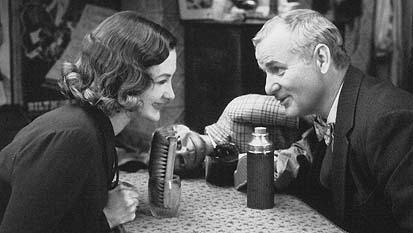| Marvelous Anticipation | ||
| The Cradle Will Rock | ||
 Copyright © Touchstone Pictures. All rights reserved. |
||
| Review by Ross Anthony | ||
|
This film's first shot unwinds with the patience, beauty and discipline of an ornate grandfather clock. It's a great set up for a movie that seems to be mostly setup anyway. Rich replication of the touch and feel of a 1930's motion picture creates the illusion of simplicity. But, the myriad characters and motivations are so vast, the dialogue and themes so intense that, ultimately, you'll be surprised to be viewing quite a complex film. Writer/Director/Producer Tim Robbins (responsible also for "Dead Man Walking," but perhaps better known as the lead actor in "Shawshank Redemption") says he spent seven years writing and re-writing this web of a script. The staged musical feel lends yet another hand toward sculpting the ironically false sense of lightness. It's a masterfully crafted, directed, powerfully paced and dramatically filmed work whose only fault lies in the viewer's need to wait virtually two full hours for payoff. The pace is so fierce and the web so intricate, that the set up is completed just as the climax begins. Still, the payoff genuinely pleases, mustering up a lump or two in the throat. Americans face the harsh reality of depression complicated by the unionization tribulations and the government's commie paranoia. Along with other Work Programs, FDR spearheads "Federal Theater" designed to put artists back to work while providing low cost entertainment for the masses. A fine plan indeed, until the government realizes that their commissioned artists have rather "politically incorrect" (for the time) themes to express. The film focuses on a theater group directed by Orson Welles (played by Angus MacFadyen) as it develops a musical ("The Cradle Will Rock") so controversial that the participants must jeopardize their rare and precious jobs to continue. Other historic personalities are brought back to life as censorship debates arise, making this a great film for the high school history teacher to present in class. You'll marvel at it .. simply marvel. But you may not "feel" until the climax. |
||
|
|
||
|
||
Grade..........................B+ |
||
Copyright © 1999. Ross Anthony, currently based in Los Angeles, has scripted and shot documentaries, music videos, and shorts in 35 countries across North America, Europe, Africa and Asia. For more reviews visit: RossAnthony.com |
||
|





